- Home
- André Aciman
Call Me by Your Name: A Novel Page 6
Call Me by Your Name: A Novel Read online
Page 6
“Sometimes the only way to understand an artist is to wear his shoes, to get inside him. Then everything else flows naturally.”
We talked about books again. I had seldom spoken to anyone about books except my father.
Or we talked about music, about the pre-Socratic philosophers, about college in the U.S.
Or there was Vimini.
The first time she intruded on our mornings was precisely when I’d been playing a variation on Brahms’s last variations on Handel.
Her voice broke up the intense midmorning heat.
“What are you doing?”
“Working,” I replied.
Oliver, who was lying flat on his stomach on the edge of the pool, looked up with the sweat pouring down between his shoulder blades.
“Me too,” he said when she turned and asked him the same question.
“You were talking, not working.”
“Same thing.”
“I wish I could work. But no one gives me any work.”
Oliver, who had never seen Vimini before, looked up to me, totally helpless, as though he didn’t know the rules of this conversation.
“Oliver, meet Vimini, literally our next-door neighbor.”
She offered him her hand and he shook it.
“Vimini and I have the same birthday, but she is ten years old. Vimini is also a genius. Isn’t it true you’re a genius, Vimini?”
“So they say. But it seems to me that I may not be.”
“Why is that?” Oliver inquired, trying not to sound too patronizing.
“It would be in rather bad taste for nature to have made me a genius.”
Oliver looked more startled than ever: “Come again?”
“He doesn’t know, does he?” she was asking me in front of him.
I shook my head.
“They say I may not live long.”
“Why do you say that?” He looked totally stunned. “How do you know?”
“Everyone knows. Because I have leukemia.”
“But you’re so beautiful, so healthy-looking, and so smart,” he protested.
“As I said, a bad joke.”
Oliver, who was now kneeling on the grass, had literally dropped his book on the ground.
“Maybe you can come over one day and read to me,” she said. “I’m really very nice—and you look very nice too. Well, goodbye.”
She climbed over the wall. “And sorry if I spooked you—well—”
You could almost watch her trying to withdraw the ill-chosen metaphor.
If the music hadn’t already brought us closer together at least for a few hours that day, Vimini’s apparition did.
We spoke about her all afternoon. I didn’t have to look for anything to say. He did most of the talking and the asking. Oliver was mesmerized. For once, I wasn’t speaking about myself.
Soon they became friends. She was always up in the morning after he returned from his morning jog or swim, and together they would walk over to our gate, and clamber down the stairs ever so cautiously, and head to one of the huge rocks, where they sat and talked until it was time for breakfast. Never had I seen a friendship so beautiful or more intense. I was never jealous of it, and no one, certainly not I, dared come between them or eavesdrop on them. I shall never forget how she would give him her hand once they’d opened the gate to the stairway leading to the rocks. She seldom ever ventured that far unless accompanied by someone older.
When I think back to that summer, I can never sort the sequence of events. There are a few key scenes. Otherwise, all I remember are the “repeat” moments. The morning ritual before and after breakfast: Oliver lying on the grass, or by the pool, I sitting at my table. Then the swim or the jog. Then his grabbing a bicycle and riding to see the translator in town. Lunch at the large, shaded dining table in the other garden, or lunch indoors, always a guest or two for lunch drudgery. The afternoon hours, splendid and lush with abundant sun and silence.
Then there are the leftover scenes: my father always wondering what I did with my time, why I was always alone; my mother urging me to make new friends if the old ones didn’t interest me, but above all to stop hanging around the house all the time—books, books, books, always books, and all these scorebooks, both of them begging me to play more tennis, go dancing more often, get to know people, find out for myself why others are so necessary in life and not just foreign bodies to be sidled up to. Do crazy things if you must, they told me all the while, forever prying to unearth the mysterious, telltale signs of heartbreak which, in their clumsy, intrusive, devoted way, both would instantly wish to heal, as if I were a soldier who had strayed into their garden and needed his wound immediately stanched or else he’d die. You can always talk to me. I was your age once, my father used to say. The things you feel and think only you have felt, believe me, I’ve lived and suffered through all of them, and more than once—some I’ve never gotten over and others I’m as ignorant about as you are today, yet I know almost every bend, every toll-booth, every chamber in the human heart.
There are other scenes: the postprandial silence—some of us napping, some working, others reading, the whole world basking away in hushed semitones. Heavenly hours when voices from the world beyond our house would filter in so softly that I was sure I had drifted off. Then afternoon tennis. Shower and cocktails. Waiting for dinner. Guests again. Dinner. His second trip to the translator. Strolling into town and back late at night, sometimes alone, sometimes with friends.
Then there are the exceptions: the stormy afternoon when we sat in the living room, listening to the music and to the hail pelting every window in the house. The lights would go out, the music would die, and all we had was each other’s faces. An aunt twittering away about her dreadful years in St. Louis, Missouri, which she pronounced San Lui, Mother trailing the scent of Earl Grey tea, and in the background, all the way from the kitchen downstairs, the voices of Manfredi and Mafalda—spare whispers of a couple bickering in loud hisses. In the rain, the lean, cloaked, hooded figure of the gardener doing battle with the elements, always pulling up weeds even in the rain, my father signaling with his arms from the living room window, Go back, Anchise, go back.
“That man gives me the creeps,” my aunt would say.
“That creep has a heart of gold,” my father would say.
But all of these hours were strained by fear, as if fear were a brooding specter, or a strange, lost bird trapped in our little town, whose sooty wing flecked every living thing with a shadow that would never wash. I didn’t know what I was afraid of, nor why I worried so much, nor why this thing that could so easily cause panic felt like hope sometimes and, like hope in the darkest moments, brought such joy, unreal joy, joy with a noose tied around it. The thud my heart gave when I saw him unannounced both terrified and thrilled me. I was afraid when he showed up, afraid when he failed to, afraid when he looked at me, more frightened yet when he didn’t. The agony wore me out in the end, and, on scalding afternoons, I’d simply give out and fall asleep on the living room sofa and, though still dreaming, know exactly who was in the room, who had tiptoed in and out, who was standing there, who was looking at me and for how long, who was trying to pick out today’s paper while making the least rustling sound, only to give up and look for tonight’s film listings whether they woke me or not.
The fear never went away. I woke up to it, watched it turn to joy when I heard him shower in the morning and knew he’d be downstairs with us for breakfast, only to watch it curdle when, rather than have coffee, he would dash through the house and right away set to work in the garden. By noon, the agony of waiting to hear him say anything to me was more than I could bear. I knew that the sofa awaited me in an hour or so. It made me hate myself for feeling so hapless, so thoroughly invisible, so smitten, so callow. Just say something, just touch me, Oliver. Look at me long enough and watch the tears well in my eyes. Knock at my door at night and see if I haven’t already left it ajar for you. Walk inside. There’s always room in my
bed.
What I feared most were the days when I didn’t see him for stretches at a time—entire afternoons and evenings sometimes without knowing where he’d been. I’d sometimes spot him crossing the piazzetta or talking to people I’d never seen there. But that didn’t count, because in the small piazzetta where people gathered around closing time, he seldom gave me a second look, just a nod which might have been intended less for me than for my father, whose son I happened to be.
My parents, my father especially, couldn’t have been happier with him. Oliver was working out better than most of our summer residents. He helped my father organize his papers, managed a good deal of his foreign correspondence, and was clearly coming along with his own book. What he did in his private life and his time was his business—If youth must canter, then who’ll do the galloping? was my father’s clumsy adage. In our household, Oliver could do no wrong.
Since my parents never paid any attention to his absences, I thought it was safer never to show that they caused me any anxiety. I mentioned his absence only when one of them wondered where he’d been; I would pretend to look as startled as they were. Oh, that’s right, he’s been gone so long. No, no idea. And I had to worry not to look too startled either, for that might ring false and alert them to what was eating at me. They’d know bad faith as soon as they spotted it. I was surprised they hadn’t already. They had always said I got too easily attached to people. This summer, though, I finally realized what they meant by being too easily attached. Obviously, it had happened before, and they must have already picked up on it when I was probably too young to notice anything myself. It had sent alarming ripples through their lives. They worried for me. I knew they were right to worry. I just hoped they’d never know how far things stood beyond their ordinary worries now. I knew they didn’t suspect a thing, and it bothered me—though I wouldn’t have wanted it otherwise. It told me that if I were no longer transparent and could disguise so much of my life, then I was finally safe from them, and from him—but at what price, and did I want to be so safe from anyone?
There was no one to speak to. Whom could I tell? Mafalda? She’d leave the house. My aunt? She’d probably tell everyone. Marzia, Chiara, my friends? They’d desert me in a second. My cousins when they came? Never. My father held the most liberal views—but on this? Who else? Write to one of my teachers? See a doctor? Say I needed a shrink? Tell Oliver?
Tell Oliver. There is no one else to tell, Oliver, so I’m afraid it’s going to have to be you…
One afternoon, when I knew that the house was totally empty, I went up to his room. I opened his closet and, as this was my room when there were no residents, pretended to be looking for something I’d left behind in one of the bottom drawers. I’d planned to rifle through his papers, but as soon as I opened his closet, I saw it. Hanging on a hook was this morning’s red bathing suit which he hadn’t swum in, which was why it was hanging there and not drying on the balcony. I picked it up, never in my life having pried into anyone’s personal belongings before. I brought the bathing suit to my face, then rubbed my face inside of it, as if I were trying to snuggle into it and lose myself inside its folds—So this is what he smells like when his body isn’t covered in suntan lotion, this is what he smells like, this is what he smells like, I kept repeating to myself, looking inside the suit for something more personal yet than his smell and then kissing every corner of it, almost wishing to find hair, anything, to lick it, to put the whole bathing suit into my mouth, and, if I could only steal it, keep it with me forever, never ever let Mafalda wash it, turn to it in the winter months at home and, on sniffing it, bring him back to life, as naked as he was with me at this very moment. On impulse, I removed my bathing suit and began to put his on. I knew what I wanted, and I wanted it with the kind of intoxicated rapture that makes people take risks they would never take even with plenty of alcohol in their system. I wanted to come in his suit, and leave the evidence for him to find there. Which was when a crazier notion possessed me. I undid his bed, took off his suit, and cuddled it between his sheets, naked. Let him find me—I’ll deal with it, one way or another. I recognized the feel of the bed. My bed. But the smell of him was all around me, wholesome and forgiving, like the strange scent which had suddenly come over my entire body when an elderly man who happened to be standing right next to me in a temple on Yom Kippur placed his tallis over my head till I had all but disappeared and was now united with a nation that is forever dispersed but which, from time to time, comes together again when one being and another wrap themselves under the same piece of cloth. I put his pillow over my face, kissed it savagely, and, wrapping my legs around it, told it what I lacked the courage to tell everyone else in the world. Then I told him what I wanted. It took less than a minute.
The secret was out of my body. So what if he saw. So what if he caught me. So what, so what, so what.
On my way from his room to mine I wondered if I’d ever be mad enough to try the same thing again.
That evening I caught myself keeping careful tabs on where everyone was in the house. The shameful urge was upon me sooner than I’d ever imagined. It would have taken nothing to sneak back upstairs.
While reading in my father’s library one evening, I came upon the story of a handsome young knight who is madly in love with a princess. She too is in love with him, though she seems not to be entirely aware of it, and despite the friendship that blossoms between them, or perhaps because of that very friendship, he finds himself so humbled and speechless owing to her forbidding candor that he is totally unable to bring up the subject of his love. One day he asks her point-blank: “Is it better to speak or die?”
I’d never even have the courage to ask such a question.
But what I’d spoken into his pillow revealed to me that, at least for a moment, I’d rehearsed the truth, gotten it out into the open, that I had in fact enjoyed speaking it, and if he happened to pass by at the very moment I was muttering things I wouldn’t have dared speak to my own face in the mirror, I wouldn’t have cared, wouldn’t have minded—let him know, let him see, let him pass judgment too if he wants—just don’t tell the world—even if you’re the world for me right now, even if in your eyes stands a horrified, scornful world. That steely look of yours, Oliver, I’d rather die than face it once I’ve told you.
Part 2
Monet’s Berm
Toward the end of July things finally came to a head. It seemed clear that after Chiara there had been a succession of cotte, crushes, mini-crushes, one-night crushes, flings, who knows. To me all of it boiled down to one thing only: his cock had been everywhere in B. Every girl had touched it, that cock of his. It had been in who knows how many vaginas, how many mouths. The image amused me. It never bothered me to think of him between a girl’s legs as she lay facing him, his broad, tanned, glistening shoulders moving up and down as I’d imagined him that afternoon when I too had wrapped my legs around his pillow.
Just looking at his shoulders when he happened to be going over his manuscript in his heaven made me wonder where they’d been last night. How effortless and free the movement of his shoulder blades each time he shifted, how thoughtlessly they caught the sun. Did they taste of the sea to the woman who had lain under him last night and bitten into him? Or of his suntan lotion? Or of the smell that had risen from his sheets when I went into them?
How I wished I had shoulders like his. Maybe I wouldn’t long for them if I had them?
Muvi star.
Did I want to be like him? Did I want to be him? Or did I just want to have him? Or are “being” and “having” thoroughly inaccurate verbs in the twisted skein of desire, where having someone’s body to touch and being that someone we’re longing to touch are one and the same, just opposite banks on a river that passes from us to them, back to us and over to them again in this perpetual circuit where the chambers of the heart, like the trapdoors of desire, and the wormholes of time, and the false-bottomed drawer we call identity share a beguiling logic
according to which the shortest distance between real life and the life unlived, between who we are and what we want, is a twisted staircase designed with the impish cruelty of M. C. Escher. When had they separated us, you and me, Oliver? And why did I know it, and why didn’t you? Is it your body that I want when I think of lying next to it every night or do I want to slip into it and own it as if it were my own, as I did when I put on your bathing suit and took it off again, all the while craving, as I craved nothing more in my life that afternoon, to feel you slip inside me as if my entire body were your bathing suit, your home? You in me, me in you…
Then came the day. We were in the garden, I told him of the novella I had just finished reading.
“About the knight who doesn’t know whether to speak or die. You told me already.”
Obviously I had mentioned it and forgotten.
“Yes.”
“Well, does he or doesn’t he?”
“Better to speak, she said. But she’s on her guard. She senses a trap somewhere.”
“So does he speak?”
“No, he fudges.”
“Figures.”
It was just after breakfast. Neither of us felt like working that day.
“Listen, I need to pick up something in town.”
Something was always the latest pages from the translator.
“I’ll go, if you want me to.”
He sat silently a moment.
“No, let’s go together.”

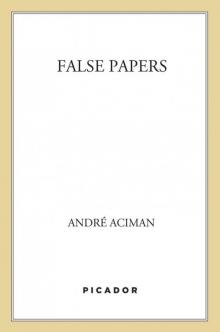 False Papers
False Papers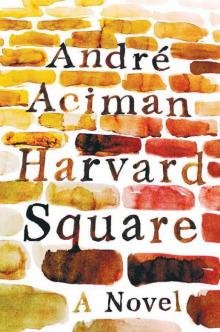 Harvard Square
Harvard Square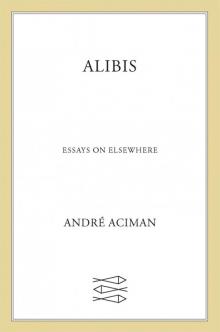 Alibis
Alibis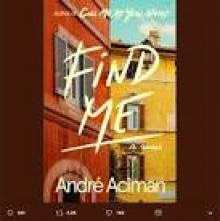 Find Me
Find Me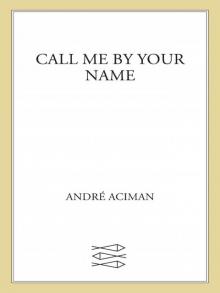 Call Me by Your Name
Call Me by Your Name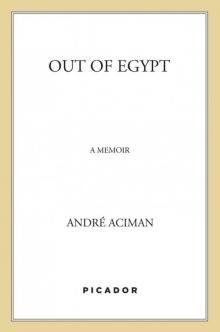 Out of Egypt: A Memoir
Out of Egypt: A Memoir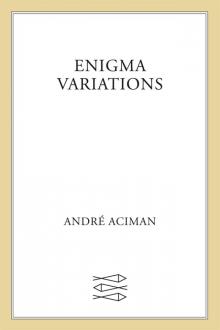 Enigma Variations
Enigma Variations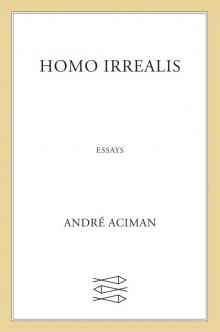 Homo Irrealis
Homo Irrealis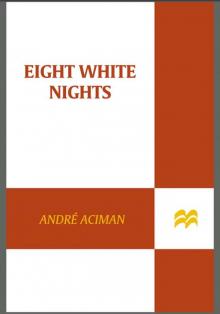 Eight White Nights
Eight White Nights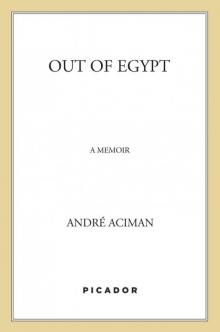 Out of Egypt
Out of Egypt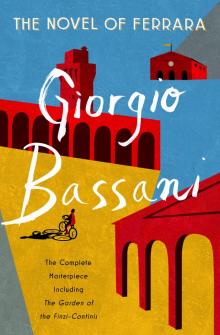 The Novel of Ferrara
The Novel of Ferrara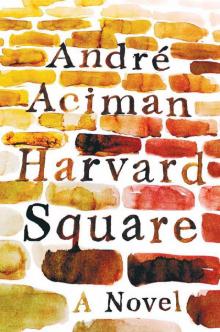 Harvard Square: A Novel
Harvard Square: A Novel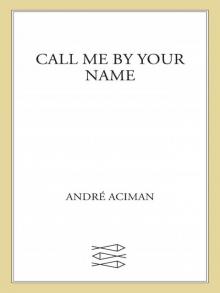 Call Me by Your Name: A Novel
Call Me by Your Name: A Novel